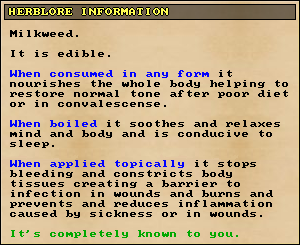Milkweed
| Milkweed | ||
|---|---|---|
| | ||
| Basic Info | ||
| Type: | Plant, Herb | |
| Known By: | ? | |
| Region: | ? | |
| Terrain: | Cliff, Clearing, Fresh, Dry, Grove | |
| Cultivated: | ? | |
| Edible: | Yes (raw, cooked, boiled) | |
| Growth Information | ||
| Sprout Month: | June (approx.) | |
| Growth Time: | 60 days | |
| Harvest Date: | August (approx.) | |
| Wither Month: | September (approx.) | |
| Harvest Information | ||
| Harvest Tool: | ? | |
| Produces: | Roots | |
| Food Information | ||
| Carbs: | 19 | |
| Fat: | 3 | |
| Protein: | 5 | |
Milkweed is a kind of edible herb, commonly found near cliffs, clearings and groves. Milkweed is one of the earliest plants to grow and to mature. It can be harvested and threshed to provide roots.
Herb effects
When consumed, either cooked or raw, milkweed is a:
- tonic
When boiled, milkweed is a:
- sedative
When applied to wounds, milkweed is an:
- astringent
- anti-inflammatory
In real life
Common milkweed (Asclepias syriaca) shares milkweed's in-game appearance of tall stems with pink flowers; but this plant is native to North America and is also toxic.
Milkweed might be based on lavender (Lavandula angustifolia), which has tall stems with distinctively-scented blue-purple flowers. Lavender is edible and often used as a sedative herbal remedy, but usually considered native to Spain and the Mediterranean.
It is also possible that milkweed is a completely fictional plant, and the name is chosen simply to convey that the plant has milky white sap.
Milkweed is actually Chamerion angustifolium which has a milk related name in Finnish. [1]
